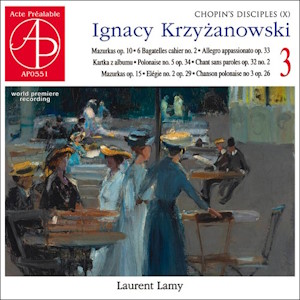
Ignacy Krzyżanowski (1826-1905)
Piano Works Volume 3
Laurent Lamy (piano)
rec. 2016-2022, Polski Radio Studio S1
Acte Préalable AP0551 [68]
Laurent Lamy’s exploration of Ignacy Krzyżanowski’s piano music continues apace with this third volume and as in the two previous outings (Volume 1 ~ Volume 2) he plays this selection as a recital programme. I would refer you to those reviews for biographical info; the booklet here fills out our knowledge of the composer and, even more interestingly, includes another extract from an article containing Krzyżanowski’s recollections of meeting Chopin and other musicians during his early years in Paris.
Once again many of the pieces follow Chopin’s model and the closest perhaps are the selection of Mazurkas. The first of the op.15 swaps a melody between right and left hand and the simplicity of harmony here gives no hint of the more complex harmony as the piece progresses. The second is more impressive, a melancholic left-hand tune for the outer sections and a more light-hearted one to follow. A vigorous dance interrupts proceedings before some contrapuntal lines lead back to the opening mood. The two mazurkas published as op.10 follow the same kind of plan; a series of contrasting sections with a bright dance somewhere along the way. Op.10 no.2 has perhaps the most Chopinesque opening – think Chopin op.7 no.3 – and indeed throughout its pages I kept hearing little passages that made me think of bars from Chopin’s music. The fifth Polonaise has some nice moments but as for being characterised by a rich symbolism, being a clear reference to Fryderyk Chopin’s Polonaise in A flat major op.53 I cannot hear it; it is certainly more lyrical than heroic for all its martial first theme and though there is a little hint of the central section of Chopin’s Polonaise op.26 no.1 Krzyżanowski’s gifts are more straightforward by far, not straying into the harmonic territory that Chopin explores. Continuing with what one thinks of as Chopin’s genres there is the very attractive Nocturne in E flat major that is in the style of a slow waltz, sentimental and rather tender. Akin to the nocturnes is the Elégie with its stately outer sections and marvellously passionate centre section in the major key which has a sudden and wonderful change into D major from the home key. The final section reprises some of the more lyrical music but stays in the minor key and overall this is probably one of Krzyżanowski’s more individual and successful works.
More vigorous is the Krakowiak, a duple time dance dedicated to Polish pianist and Chopin specialist Auguste de Radwan. At nearly eight minutes long it could do with a little more harmonic interest; much of the dance is based on two or three chords and as they repeat quite often it overstays its welcome a wee bit. The six bagatelles are the second book of a set of twelve; all are short, engaging and have more modest technical demands than some of the works here. A couple of songs without words are intermingled with dance pieces; a gentile minuet, a tarantelle to close and two polish dances, a mazurka and an oberek, a cross between a fast waltz and a mazurka. Another more expansive Song without words follows these, its melody based on a minuet and reaching quite grand heights of passion. To close Laurent Lamy plays the Allegro appassionato précedé d’un andante affestuoso dedicated to Liszt who had given advice to the young Krzyżanowski in Cracow. It opens with a slow introduction, almost operatic in nature and this leads to the andante that becomes more decorated as the piece evolves. The main allegro appassionato is introduced with little hints of its outline before its resolute dotted rhythm octaves burst forth. Most of the allegro is based on dotted rhythms, either as heroic as the first theme or scherzo like and contrapuntal and it is contrasted with more lyrical, aria-like music. The opening drama returns for an extended section that somewhat interrupts the flow and the work comes across more as a fantasy or rhapsodie than the title would suggest. That said it is highly effective and idiomatic and if I would perhaps have asked for more devil-may-care attitude in some of the virtuoso passages there is no denying Lamy’s commitment to bringing this music into the opening. Thanks to his dedication and with a fourth volume announced and many opus numbers to go it seems Krzyżanowski is no longer languishing in obscurity; he is no undiscovered genius but there is plenty to admire here and it is clear that Polish music of the era wasn’t the barren wasteland that history would suggest.
Rob Challinor
Help us financially by purchasing this through MWI

Contents
Deux Mazurkas Op.15 (pub.1861)
Elégie No.2 in F sharp minor Op.29 (pub.1964)
Chanson Polonaise: Krakowiak No.3 in F sharp major Op.26 (pub.1861)
Kartka z albumu (Nokturn) in E flat major (pub.1893)
6 Bagatelles cahier No.2 (pub.1902)
Chant sans paroles in E flat major Op.32 No.2 (pub.1871)
Polonaise No.5 in E flat major Op.34 (pub.1871)
Deux Mazurkas Op.10 (pub.1852)
Allegro appassionato précedé d’un andante affestuoso in E flat major Op.33 (1874)


















